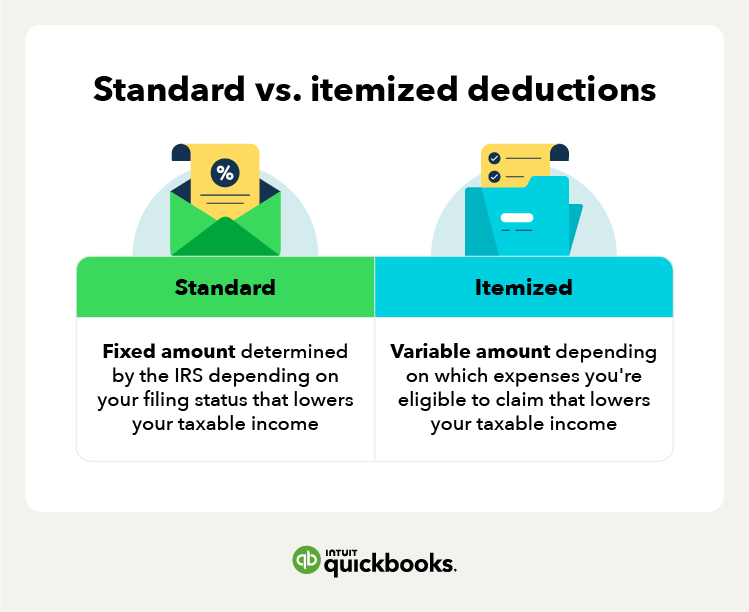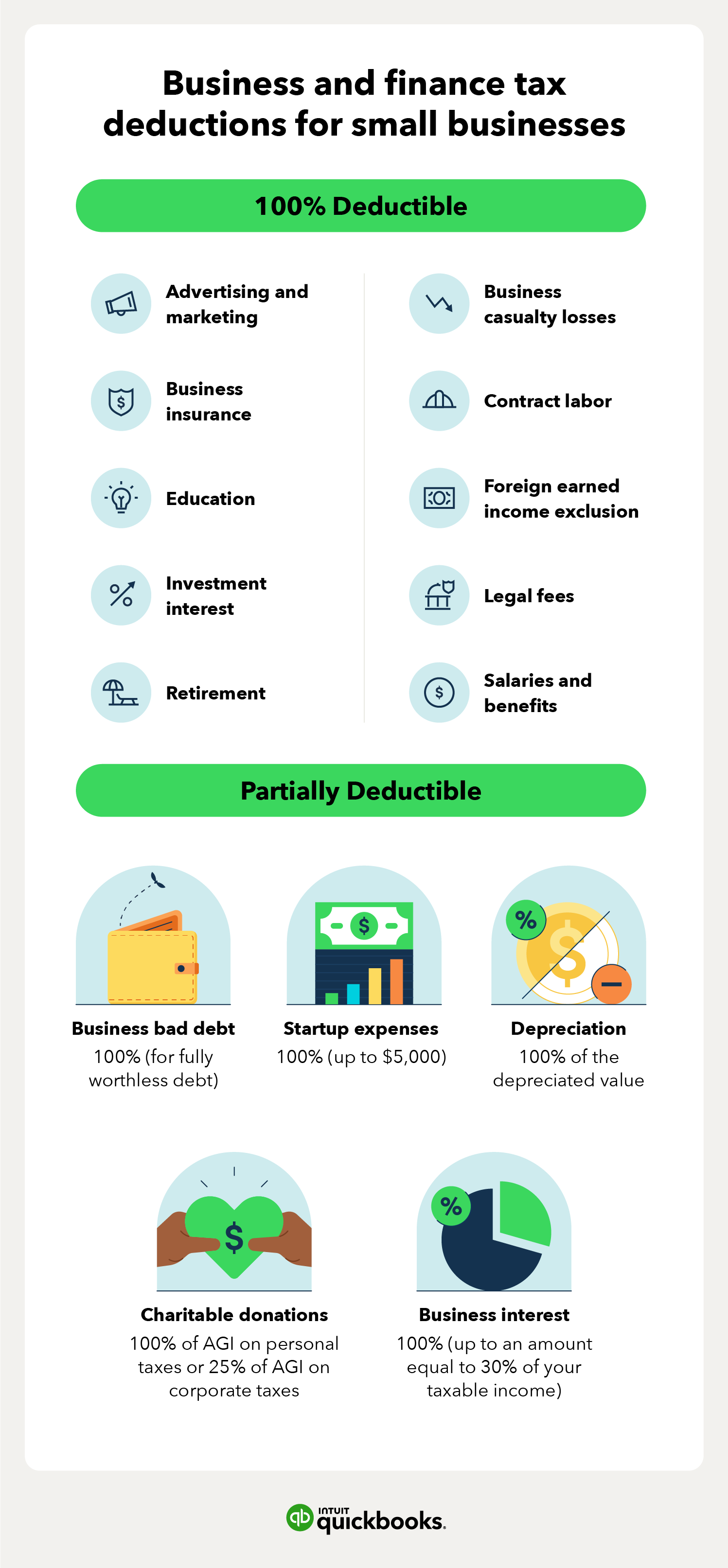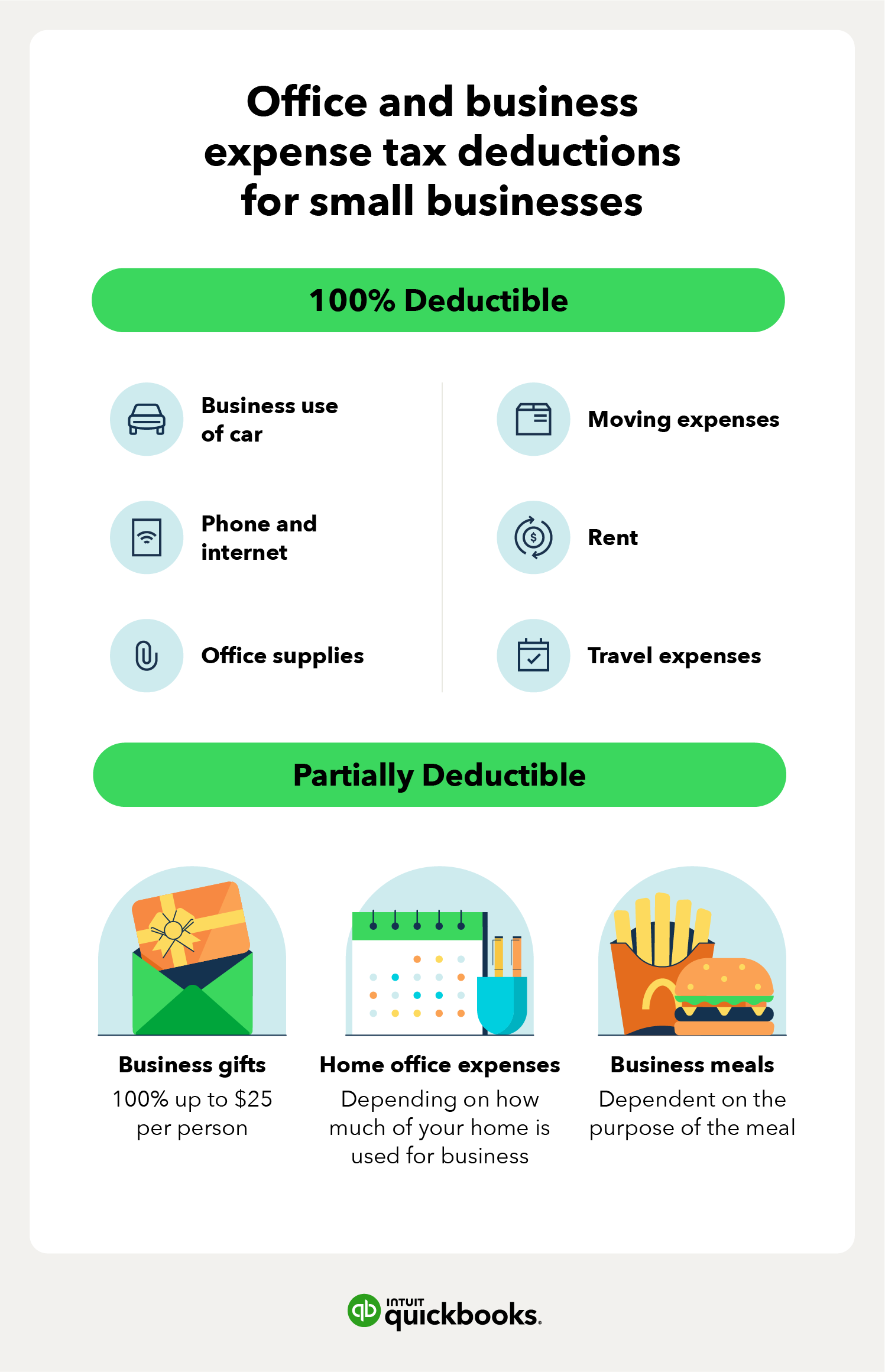When you’re a small business owner, tax time can feel overwhelming. Which of your expenses—including rent, inventory, payroll, or utilities—from the past year qualify as tax-deductible? Have new deductions been added? Have tax rule changes made other small business deductions ineligible?
Taking time away from the day-to-day management of your business to investigate every possible tax tip isn’t realistic. In this guide to small business tax deductions, we’ll tell you which deductions are available, note important changes from last year, and identify potential ways to save money on this year’s tax bill.
What is a small-business tax deduction?
A small business tax deduction is an IRS-qualifying expense that you can subtract from your taxable income.
These deductions can reduce the amount of income subject to federal and state taxation. What counts as a business expense? According to the IRS, business expenses must be both ordinary and necessary to be deductible.
Let’s say your taxable income for the year was $50,000, but you spent $10,000 on qualified deductible expenses. Essentially, your taxable income then drops to $40,000.
How do business tax deductions work?
When you file your small business taxes, there are two ways to claim tax deductions:
- Take the standard deduction: Taking the standard deduction is quicker, but you might miss out on some opportunities to save money.
- Itemize your deductions: Itemizing your deductions takes time and requires well-kept records, but it’s the best way to take full advantage of small business tax deductions.
The first step in itemizing is to list all the deductions you want to claim. The next step is to gather all necessary records that prove these small business tax write-offs: receipts, property tax documentation, and employee benefits records (if you have employees). You’ll refer to these materials as you fill out a Schedule A form with your tax return. If the IRS audits you, these documents will be your first line of defense.

What’s new in 2023?
Before diving into the complete list of small business tax deductions, note these three changes to the list of expenses you can deduct when filing your 2022 taxes.
- Employee salary deductions: The dollar limitation for employee salary deductions for contributions to health flexible spending arrangements increased from $2,750 to $2,850, and the maximum carryover amount for cafeteria plans will be $570 for the 2022 tax year, a $20 increase from the previous year.
- Medical savings account (MSA): For employees who have self-only coverage in an MSA, the maximum out-of-pocket expense increased from $4,800 to $4,950.
- Standard mileage rate: If operating your car for business purposes, the standard mileage rate for each mile of business use increased from 56 cents per mile to 58.5 cents per mile for the first half of the year. From July 1, 2022 to the end of the 2022 tax year, the rate for business travel will be 62.5 cents per mile.
Complete small business tax deductions list
Which small business tax deductions are you eligible for? The following list gives you the complete rundown of possible deductions you can take when filing your 2022 taxes. Be sure to consult a CPA or other tax professional before sending your return to the IRS.
Advertising and marketing | Business bad debt | Business casualty losses | Business insurance | Business interest | Business meals | Business use of car | Charitable donations | Contract labor | Depreciation | Education | Foreign earned income exclusion | Gifts for employees and clients | Home office expenses | Investment interest | Legal fees | Moving expenses | Office supplies and expenses | Phone and internet expenses | Rent | Retirement | Salaries and benefits | Startup expenses | Travel expenses

If you pay for advertising or marketing to promote your small business, those costs are fully tax deductible. As long as the expenses are considered ordinary, reasonable, and necessary, they qualify.
Percentage deductible:
- 100%
Eligibility:
- Any marketing or advertising expenses spent on campaigns to generate or retain customers.
Example deductions:
- Costs of producing physical advertising materials such as business cards or flyers
- TV, radio, print, and online advertising costs
- Influencer marketing
Special considerations:
- Costs that the IRS considers primarily personal or lobbying are exempt from deduction, even if they have some promotional value.
Business bad debt
When someone owes your business money and you can’t collect it, this is business bad debt (as opposed to nonbusiness bad debt). Business bad debt can happen if you sell a good or service to a customer with the understanding that they’ll pay you later (in other words, on credit), and it becomes clear they aren't going to pay you.
Percentage deductible:
- 100% (for fully worthless debt)
Eligibility:
- The debt in question must be partially or fully worthless to be considered deductible. Worth is based on the chance the amount owed will be paid back.
Example deductions:
- Loans to clients, distributors, suppliers, and employees
- Credit sales to customers
- Business loan guarantees
Special considerations:
- Business bad debts can be fully or partially worthless—meaning you’ve collected some but not all of the debt. Consult a tax professional to make sure you’re claiming the correct amount as a deductible.
Business casualty losses
This deduction applies if your business suffers theft or physical damage.
Percentage deductible:
- 100%
Eligibility:
- You must be the owner of the property and the loss must be the result of a sudden, unpredictable event.
Example deductions:
- Natural disasters
- Vandalism
- Burglary
- Civil disturbances
Special considerations:
- Things like erosion, wood decomposition, and termite damage are considered long-term losses. They don’t count as business casualty losses.
Business interest
If you take out a loan for business purposes—including a mortgage on business real estate—or obtain a line of credit for business purchases, the interest you pay is tax deductible. However, there is a limit to this. The interest expense deduction is currently 30% of your taxable income.
What does that mean? Say you take out a loan for your small business and you pay interest on it. If your taxable income is $100,000 and you paid $60,000 in interest on your loan, you could claim a $30,000 deduction (30% of your taxable income) of that interest as a tax write-off.
Percentage deductible:
- 100% (up to an amount equal to 30% of your taxable income)
Eligibility:
- You are legally liable for the acquired debt.
- You and the lender have a true debtor-creditor relationship.
- You and the lender must intend for the debt to be repaid.
Example deductions:
- Investment interest expenses
- Interest on purchases made on credit for inventory stock
- Prepaid mortgage interest on loans for business property
- Interest on credit card debt
Special considerations:
- Interest that must be capitalized does not qualify as tax-deductible. This includes any interest added to a principal balance of a business loan or mortgage. Capitalized interest should be assessed and depreciated along with other costs.
Business meals
Business meals for employees, clients, and potential clients can be tax deductible, depending on the purpose of the meal.
Percentage deductible:
- Company-wide party – 100% deductible
- Your own meals as part of doing business – 100% deductible
- Office snacks and meals – 50% deductible
- Business meals with clients – 50% deductible
- Entertaining clients – 0% deductible
Eligibility:
- The expense must be reasonable and not extravagant or excessive.
- You or an employee must be present.
- The meals must be served to a current or potential business customer, consultant, client, or similar business contact.
- If the meal is provided at an entertainment activity, it must be purchased separately from the activity itself.
Example deductions:
- Meal expenses while traveling on business
- (Reasonable) food and beverage expenses during social company activities, including holiday parties and happy hours
Special considerations:
- To be eligible, meal costs must be considered reasonable and be purchased from a restaurant to be 100% deductible. Exorbitant prices for extravagant meals likely won’t qualify as a deductible business expense.
Business use of car
If you use your vehicle for business purposes, you can deduct the associated costs. This means you’ll need to keep track of your mileage outside if your car is used for both business and personal use.
For the 2022 tax year, the optional standard mileage rate used to deduct the costs of operating a business vehicle is 58.5 cents per mile.
Percentage deductible:
- 100%
Eligibility:
- Business vehicles are cars and trucks that are used for business activities. If you want to deduct vehicle expenses, you’ll need to keep meticulous records.
Example deductions:
- Registration fees and taxes
- Gas and oil costs
- Maintenance and repairs
- Licenses
- Vehicle insurance
- Rental or lease payments
- Tolls and parking fees
Special considerations:
- If you use the vehicle for both business and personal purposes, you must split the costs based on mileage. Vehicles used as equipment—such as dump trucks—and vehicles used for hire, like taxis and airport shuttle vans, do not qualify.
Charitable donations
If you’re interested in giving back to your community through charitable donations, you can deduct the entire amount contributed.
Percentage deductible:
- 100% of adjusted gross income on personal taxes
- 25% of adjusted gross income on corporate taxes
Eligibility:
- To qualify, you must give a cash donation to a qualifying organization.
Example deductions:
- Donations to a church, synagogue, or other religious organization
- Donations to a civil defense organization established under federal, state, or local law
- Donations to a war veterans’ organization established in the US
Special considerations:
- If your business is set up as a sole proprietorship, LLC, or partnership, you should claim charitable donations on your personal taxes.
- If your business is an S corporation, you should claim charitable donations on your corporate tax return.
Contract labor
If you paid a freelancer or independent contractor to work for your small business in 2022, you can deduct their fees as a business expense.
Percentage deductible:
- 100%
Eligibility:
- The freelancer or contractor is not an employee of your small business.
- The services the freelancer or contractor provided were for your business, not for you personally.
Example deductions:
- You pay an independent accountant to review your small business taxes.
- You pay a web designer a one-time fee to optimize your business’s website.
- You pay a freelance editor to proofread monthly blog posts for your business’s website.
Special considerations:
- If you pay a contractor $600 or more during the tax year, you’re required to have them fill out a Form 1099-NEC by January 31 of the following year. They’ll need this when they’re doing their taxes.
Depreciation
Depreciation enables you to recover the costs of fixed and tangible assets over time. In other words, small business owners can regain costs associated with an asset’s age, wear, tear, and decay over its usable lifetime.
Percentage deductible:
- 100% of the depreciated value
Eligibility:
- You must own the asset.
- You must use the asset as part of your income-generating operations.
- The asset must have an estimated useful life expectancy of more than one year.
Example deductions:
- Computers
- Machinery
- Office furniture
- Business vehicles
Special considerations:
- Bonus depreciation enables you to claim a larger portion of depreciation on assets purchased within the tax year.
- With bonus depreciation, up to 100% of an asset’s cost can be deducted as long as the asset is business qualified.
Education
If you provide yourself or your employees with qualifying educational benefits, you can deduct the costs. Tax-deductible education expenses include continuing education and courses for professional licenses.
Percentage deductible:
- 100%
Eligibility:
- Deductible education costs must add value to the business and increase the workforce’s expertise and skills.
Example deductions:
- Classes and workshops intended to improve skills in your business’s field
- Subscriptions to professional publications
- Industry-related seminars, webinars, and retreats
Special considerations:
- You can’t deduct educational expenses that qualify you or an employee for a different trade.
- Courses necessary to meet the minimum education requirement for the job don’t count.
Foreign earned income exclusion
If you’re a US citizen and own a small business in another country, under certain circumstances, you can exclude your foreign income from your US business tax return. Essentially, the foreign-earned income exclusion prevents you from getting taxed twice.
Percentage deductible:
- 100%
Eligibility:
- You are a US citizen or resident alien.
- You have a qualifying presence in a foreign country met by the Bonafide Resident Test.
- You’ve paid foreign taxes on foreign-earned income.
Example deductions:
- Any foreign income earned and taxed in a foreign country.
Special considerations:
- The money you receive as a distribution of earnings and profits—rather than reasonable compensation—does not qualify.
Gifts for employees and clients
If you give each employee a gift during the holidays or send a client a fruit basket to thank them for their patronage, you can deduct the costs of these gifts, with limitations. Make sure you keep records that prove the business purpose of the gift and show the amount spent.
Percentage deductible:
- 100% up to $25 per person
Eligibility:
- You give the gifts in the course of business.
- The item is a tangible gift, not entertainment.
Example deductions:
- An employee has a baby and you send them a gift basket with baby items.
- You send a client a bottle of wine.
Special considerations:
- When you’re calculating the $25-per-person limit, there’s no need to count gifts that cost you $4.00 or less that have your business name on them, like stickers or stress balls.

Home office expenses
Many small-business owners—especially contractors and freelancers—work from a home office. If you use a home office, you might be able to deduct the costs of creating and maintaining your workspace.
Percentage deductible:
- Based on what percentage of your home you use for business. You can divide the office square footage by the total square footage of your home to find the percentage.
Eligibility:
- Though it doesn’t need to be in a separate room, your office must be in a space solely designated to work and business operations.
Example deductions:
- Designated office phone lines
- Paint and other building and improvement materials
- A portion of utility bills
- A portion of homeowners insurance
Special considerations:
- There are two primary options for home office deductions: simplified and standard. The simplified option is easier but could result in a smaller tax break, while the standard option requires a bit more math and precise recordkeeping but could get you a larger deduction.
Legal fees
Any legal fees that your small business pays can qualify as tax deductible, including any fees in legal cases that you didn’t win.
Percentage deductible:
- 100%
Eligibility:
- The expenses you incur must be considered ordinary and necessary to the business.
Example deductions:
- Fees for resolving tax issues
- Fees related to whistleblower claims
- Fees related to unlawful discrimination claims
Special considerations:
- Any legal or professional fees related to personal issues, including child custody, personal injury and property claims, and legal fees you pay to acquire business assets are exempt from deduction.
Moving expenses
If you moved your business in 2022, you might be able to deduct any expenses associated with the move.
Percentage deductible:
- 100%
Eligibility:
- The costs associated with transporting business equipment, supplies, and inventory typically qualify as deductible.
Example deductions:
- Transporting inventory stock
- Relocating machinery
Special considerations:
- Moving expenses that don't directly correlate to the business move are no longer deductible. Personal moving expenses are exempt, although some exceptions exist for military members.
Office supplies and expenses
Necessary supplies for running and maintaining a functional office are fully tax-deductible.
Percentage deductible:
- 100%
Eligibility:
- There are three key IRS rules you have to follow for an office supply to be tax-deductible:
- You must not keep a record of when you used the supplies.
- You must not take inventory of the supplies at the beginning or end of the tax year.
- Deducting these items must not significantly skew your business’s income.
Example deductions:
- Printers and ink cartridges
- Janitorial and cleaning supplies
- Work-related computer software, including software subscriptions
- Internet hosting fees for your company’s website
- Disposable kitchenware
- Pens and paper
Special considerations:
- If you bought a large number of office supplies on December 31, 2022, you can’t deduct that cost this year, because it’s highly unlikely you used all of those supplies in 2022.
Phone and internet expenses
If you use phone and internet for your small business, those costs qualify as eligible deductions.
Percentage deductible:
- 100%
Eligibility:
- Phone and internet usage must be an essential part of your business operations.
Example deductions:
- Internet service
- Phone service
- In-flight internet purchases when traveling for business
Special considerations:
- If you also use your work phone and internet for personal use, you can only deduct the percentage of the cost that you use for business purposes.
Rent
If you rent office space, a warehouse, or any other type of business property, you can qualify as a business expense on your taxes. A rent payment is any amount you pay to use the property for your small business that you do not own.
Percentage deductible:
- 100%
Eligibility:
- You must use the property for business purposes.
Example deductions:
- Rent paid on a building
- Rent paid on a business parking garage
- Rent paid on an office space
Special considerations:
- If you have or will eventually receive equity in or title to the property in question, rent expenses are not eligible. If you use a home office, you might be eligible to write off a portion of the cost.
Retirement
As a small business owner, you are responsible for funding your retirement plan. Fortunately, your contributions are tax deductible.
Percentage deductible:
- 100%
Eligibility:
- Retirement accounts must comply with IRS regulations and deemed tax-qualified.
Example deductions:
- Contributions made to tax-qualified retirement plans, such as a Roth IRA, Simple IRA, or Solo 401(k).
Special considerations:
- If you have employees, your selected retirement plan must benefit all of your employees, not just you.
Salaries and benefits
If you’re a small business owner with one or more employees, you can deduct the cost of the employee's salaries, benefits, and vacation pay. This includes regular wages, commissions, and bonuses.
Percentage deductible:
- 100%
Eligibility:
- The employee must not be the sole proprietor, a partner, or an LLC member.
- The salaries and benefits are considered reasonable, ordinary, and necessary.
- The salaries and benefits must have been paid in the year in which you are claiming the deduction.
Example deductions:
- Employee salaries
- Employee paid time off
- Employee commission and bonuses
Special considerations:
- Generally, the IRS does not challenge itemized salary and benefits deductions. However, there are some cases when the IRS will deem a deduction unreasonable—for example, if the employee is an investor or a personal acquaintance.
Startup expenses
If you launched your business in 2022, the IRS allows you to deduct up to $5,000 in startup costs, so long as those expenses didn’t exceed $50,000. If your startup expenses exceeded $50,000, your deduction will be reduced.
Percentage deductible:
- 100% (up to $5,000)
Eligibility:
- A startup cost is deductible if you incurred it before the day your business began and it is a cost you would normally deduct when operating an existing business.
Example deductions:
- Marketing costs
- Travel costs
- Training costs
Special considerations:
- If you are buying tangible assets for your business that you will use for more than one year, the costs of these assets must be depreciated over their lifespans.
Travel expenses
If you travel to meet a client, attend a conference, or for any other business-related reason, you can deduct your travel expenses.
Percentage deductible:
- 100%
Eligibility:
- For a trip to qualify as business travel, it must be considered ordinary, necessary, and to a destination away from the state you do business in.
Example deductions:
- Plane, train, or bus ticket costs
- Parking and toll fees
- Fares for taxis, Ubers, Lyfts, or other transportation
- Cost of lodging
Special considerations:
- If most of your trip is spent doing things unrelated to business, the IRS considers this a vacation and your expenses aren’t deductible. Make sure to save documentation that proves your trip was for business.
Take the stress out of small business taxes
Running your own small business is rewarding, but can come with many learning curves—like tracking your small business expenses and doing your taxes.
Luckily, small business accounting software like QuickBooks can help make the process less taxing by helping you track expenses throughout the year—either on your own or with the help of a virtual bookkeeper.
And if you’re considering seeing a CPA or other tax professional, we compiled tax resources and guides that can help you with that process, including a list of the documents to bring with you when you meet with your tax preparer. No matter what route you choose, we’re here to help.
Related:
- https://quickbooks.intuit.com/r/expenses/how-to-calculate-and-track-overhead-costs/
- https://quickbooks.intuit.com/r/expenses/how-to-track-expenses/
- https://quickbooks.intuit.com/r/payroll/payroll-expenses/
- https://quickbooks.intuit.com/r/taxes/small-business-tax-forms/
Next Up:

Whether you've started a small business or are self-employed, bring your work to life with our helpful advice, tips and strategies.



